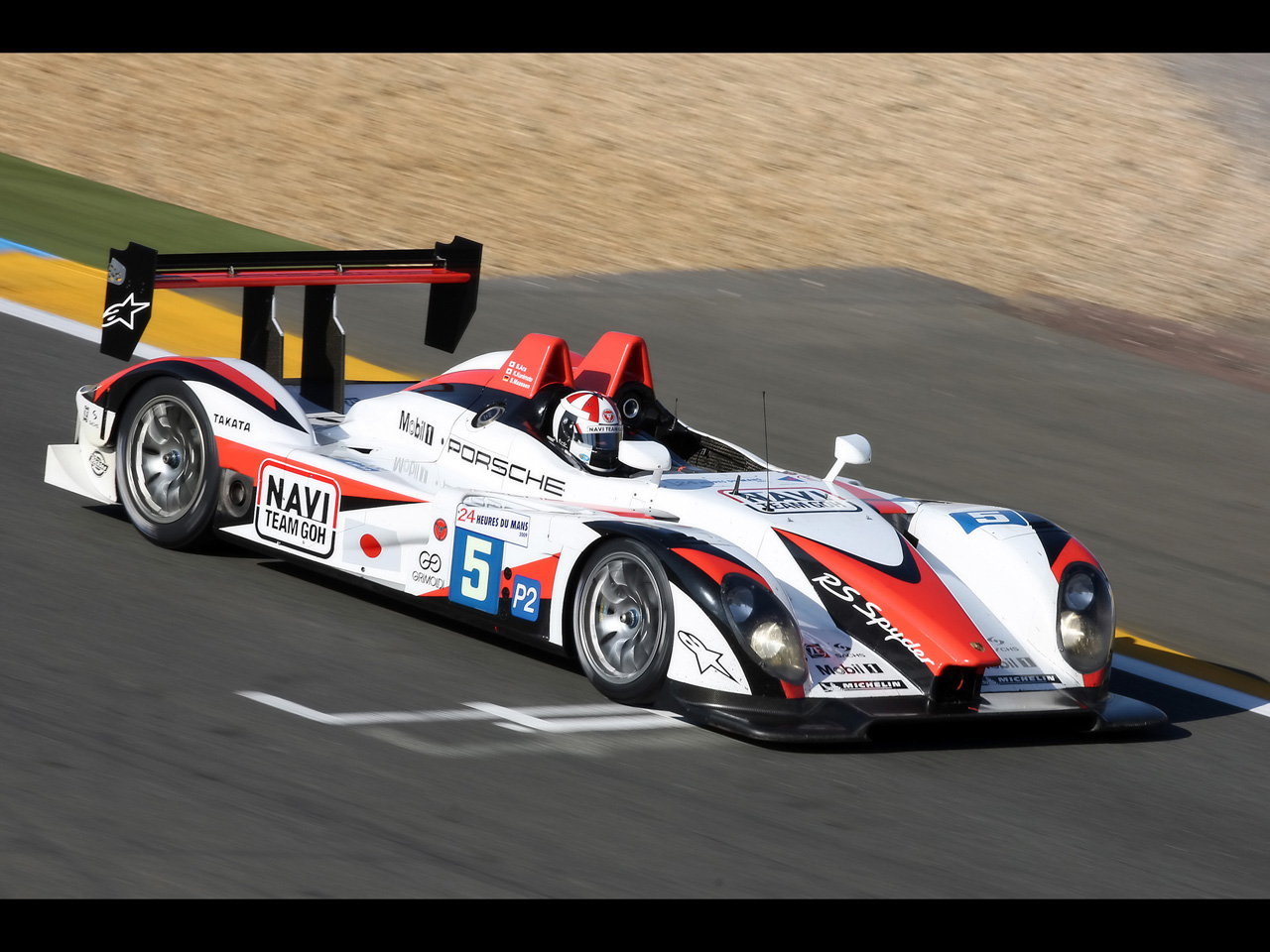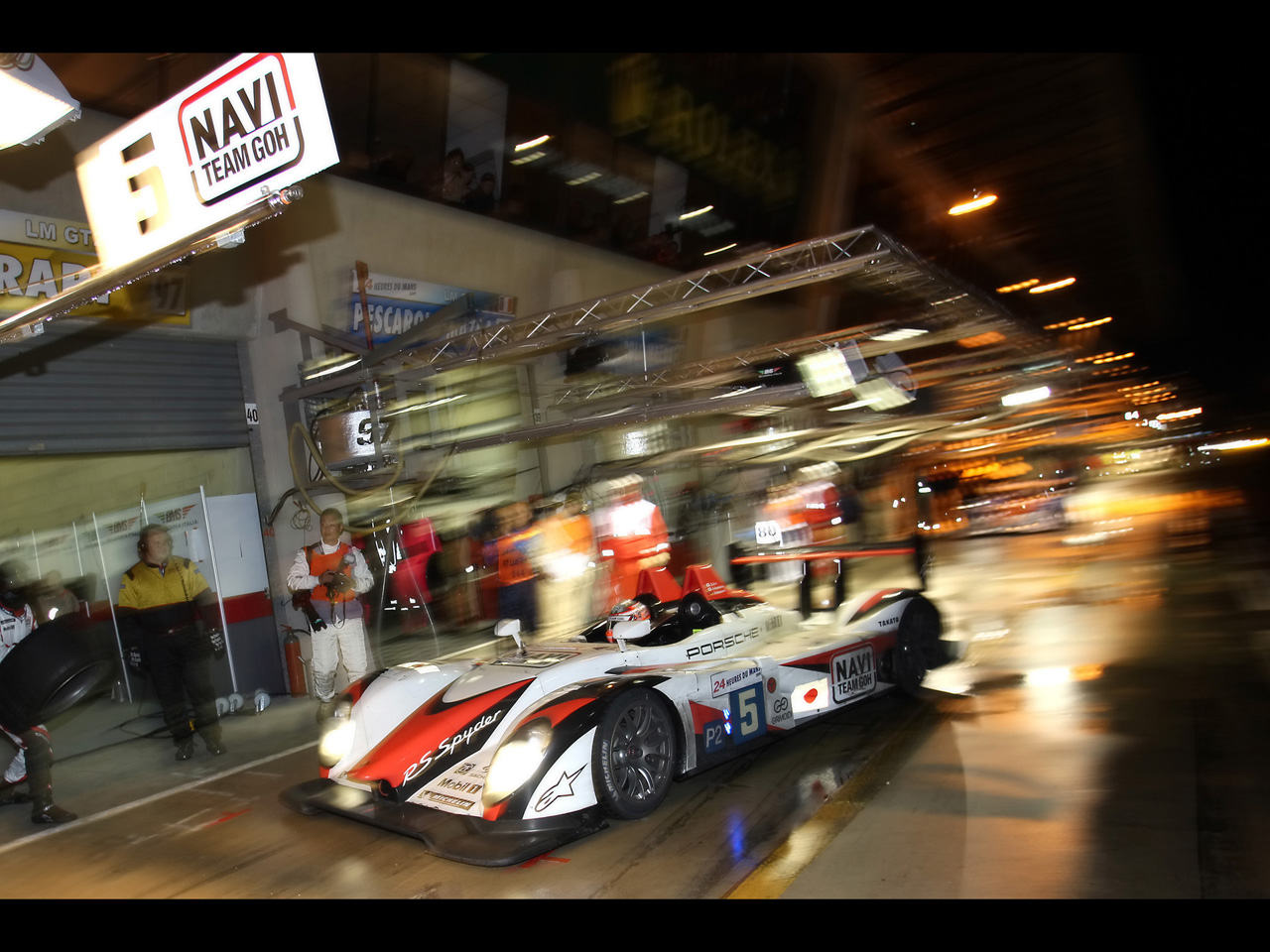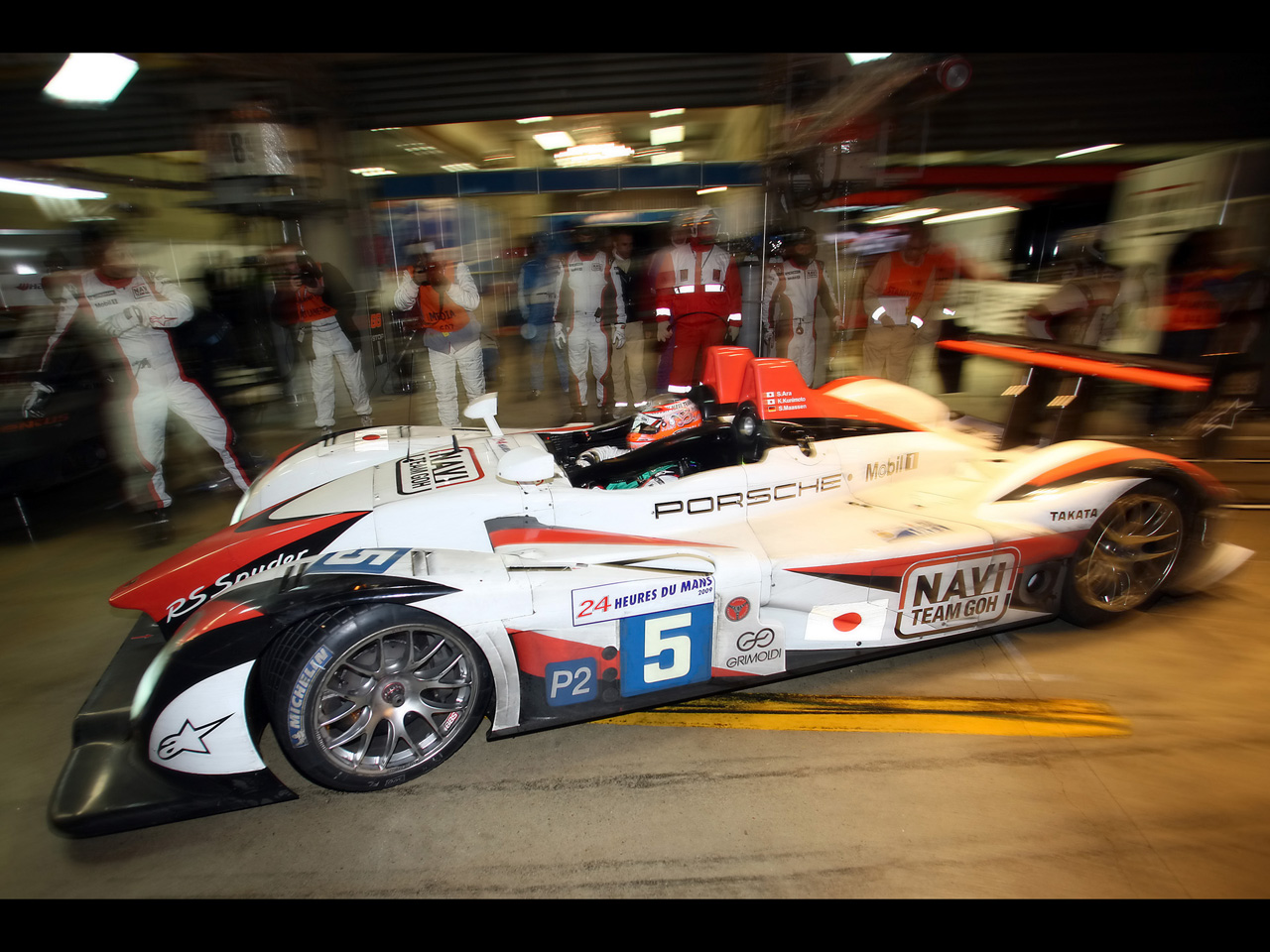2009 Porsche RS Spyder Le Mans LMP2 Winner
|
Price |
-- |
Production |
-- | ||
|
Engine |
-- |
Weight |
-- | ||
|
Aspiration |
-- |
Torque |
-- | ||
|
HP |
-- |
HP/Weight |
-- | ||
|
HP/Liter |
-- |
1/4 mile |
-- | ||
|
0-62 mph |
-- |
Top Speed |
-- |
(from Porsche Press
Release) Win and energy efficiency award for Porsche RS Spyder
Stuttgart. The success story of the Porsche RS Spyder continues: At
the Le Mans 24 Hour race, the Essex team (Denmark) celebrated a
clear victory in the LMP2 class. The 440 hp sports prototype from
Weissach also won the energy efficiency classification “Michelin
Green X Challenge” as the car with the best overall efficiency,
calculated by the ratio between lap times and fuel consumption. The
RS Spyder of the Danish customer team beat its rivals in the LMP2
class by 15 laps. One hour before the end of the race, the RS Spyder
of NAVI Team GOH spun off the track while running an easy second
under braking for the first chicane on the Hunaudières straight on
an oil spill of a competitor, hit the barriers and retired. The
Japanese driver Seiji Ara was uninjured.
“We’re proud that in customer hands the RS Spyder not only confirmed
its high speed and reliability again but also won the environmental
classification. It’s such a great pity that the second RS Spyder
retired. NAVI Team GOH put in an immaculate performance and really
would have deserved to secure second,” said Porsche Head of
Motorsport, Hartmut Kristen. In 2008, the RS Spyder won the energy
efficiency challenge at all races and championships – in the Le Mans
24 Hours, the American Le Mans Series and the European Le Mans
Series. With this, the RS Spyder impressively underlined its status
as the world’s most efficient sports prototype.
“After claiming second last year we are absolutely over the moon
with our victory today,” said Essex driver Casper Elgaard (Denmark).
“This is a huge success for our Danish team, which only began
competing in long distance racing last year.” Porsche works driver
Emmanuel Collard (France) added: “The key to success was the RS
Spyder. We didn’t have the slightest technical problem and turned
fast and steady laps.” Only once in the night was there an
unscheduled stop. Before the first Hunaudières chicane, the two
close-running RS Spyder hit a patch of oil and began to slide.
Keisuki Kunimoto (NAVI Team GOH) nudged the Essex car, resulting in
both vehicles having body parts replaced. “Our crew did a super
job,” said the third Essex driver, Kristian Poulsen (Denmark), who
celebrated his Le Mans debut with victory. “I would like to thank
the team and mostly Casper and Emmanuel. They did most of the work.”
After a break of four years, NAVI Team GOH, Le Mans winner of 2004
with Seiji Ara, looked like they would bring home a safe second
place right up until an hour before the flag – with a ten lap
advantage over third position. Oil from a competitor became Ara’s
eventual fate. “I had no chance. Two wheels hit the oil that I
couldn’t see while braking,” said Seiji Ara. “It’s a bitter end of a
great race. I’m pleased that the RS Spyder is not only fast, but
also safe.” His compatriot Keisuke Kunimoto contested the long
distance classic for the first time. Porsche works driver Sascha
Maassen was full of praise: “I salute our team’s performance.
Perfect preparation, perfect team work in every respect. I’m so
sorry that we couldn’t bring home the success they deserved.” For
the perfect work in the pit stops, the team received a special prize
from the organisers.
Porsche works drivers Timo Bernhard (Germany) and Romain Dumas
(France), lent to Audi for the Le Mans 24 hour race, lost all
chances to win with a technical defect in their #3 Audi R15 TDI
which resulted in repairs over several hours on Saturday night. With
their chase through the field from the back to finish 18th, the two
shone with their excellent lap times. “It hurts to be out of
contention for overall victory so early on,” summarised Bernhard.
“Still, it was great fun. The Audi crew made us feel very welcome
from the first moment on,” added Dumas.
In the production-based GT2 class, the double pole for the 911 GT3
RSR from qualifying could not be turned into a race success. After
just two hours, the race came to an end for the three Porsche works
drivers Marc Lieb (Germany), Richard Lietz (Austria) and Wolf
Henzler (Germany). A problem with the fuel system caused the engine
of the 911 to die and not start again – 100 metres from the entrance
to the pit lane. As the regulations do not allow a car to be towed
in such a case, the leading trio of the German Felbermayr-Proton
team had no chance to repair the otherwise technically perfect 911
and retired. “Of course I’m very disappointed,” said Marc Lieb. “But
we are looking ahead and already looking forward to the next race in
the Le Mans Series, where we want to extend our championship lead
with another victory.”
For the American Flying Lizard team, the 2009 Le Mans race ended in
the early morning hours when Darren Law (USA) collided heavily with
the barriers. Prior to this, pole-setter Jörg Bergmeister (Germany)
and team owner/gentleman driver Seth Neiman (USA) were steadily
moving in the direction of a podium result with their GT3 RSR. The
French IMSA Performance Matmut team with Porsche works drivers
Patrick Pilet (France) and Patrick Long (USA) as well as Raymond
Narac (France) maintained third place for more than two-thirds of
the race distance. On Sunday morning a problem with the power
transmission put an end to their promising charge.
Race result LMP2
1. Elgaard/Collard/Poulsen
(DK/F/DK), Porsche RS Spyder, 357 laps
2. Kane/Leuenberger/Pompidou (GB/CH/F), Lola Judd, 353
3. Nicolet/Hein/Yvon (F/MC/F), Pescarolo Mazda, 325
4. Barazi/Bennett/Moseley (DK/GB/GB), Zytek 07S, 306
Note: Photo material for the 24 Hour of Le Mans is available for
accredited journalists to download from the Porsche press database
under the internet address
http://presse.porsche.de
Facts and figures
24 Hours of Le Mans
The 55-strong grid line-up for the Le Mans 24 Hours is made up of
two different sports car categories: Sports prototypes and standard
sports cars. The technical regulations of the long distance classic
are the basis for the European Le Mans Series (LMS), in which one RS
Spyder competes in 2009, and the American Le Mans Series (ALMS). All
race cars take off at the same time in Le Mans. There is an overall
classification and classifications for each class.
The four classes in Le Mans:
LMP1 class: Sports prototypes with up to 700 hp and a minimum weight
of 900 kilograms. Power to weight ratio: ca. 1.3 kg/hp.
LMP2 class: Sports prototypes with around 440 hp (with normally
aspirated engines) and an 825 kilogram minimum weight. Power to
weight ratio: ca. 1.8 kg/hp. The Porsche RS Spyder starts in this
class.
GT1 class: Strongly modified standard sports car with up to 650 hp
and a minimum weight of 1,125 – 1,325 kilograms.
GT2 class: Slightly modified standard sports cars with 450 to 460 hp
and a minimum weight of 1,145 – 1,345 kilograms. The Porsche 911 GT3
RSR competes in this class.



